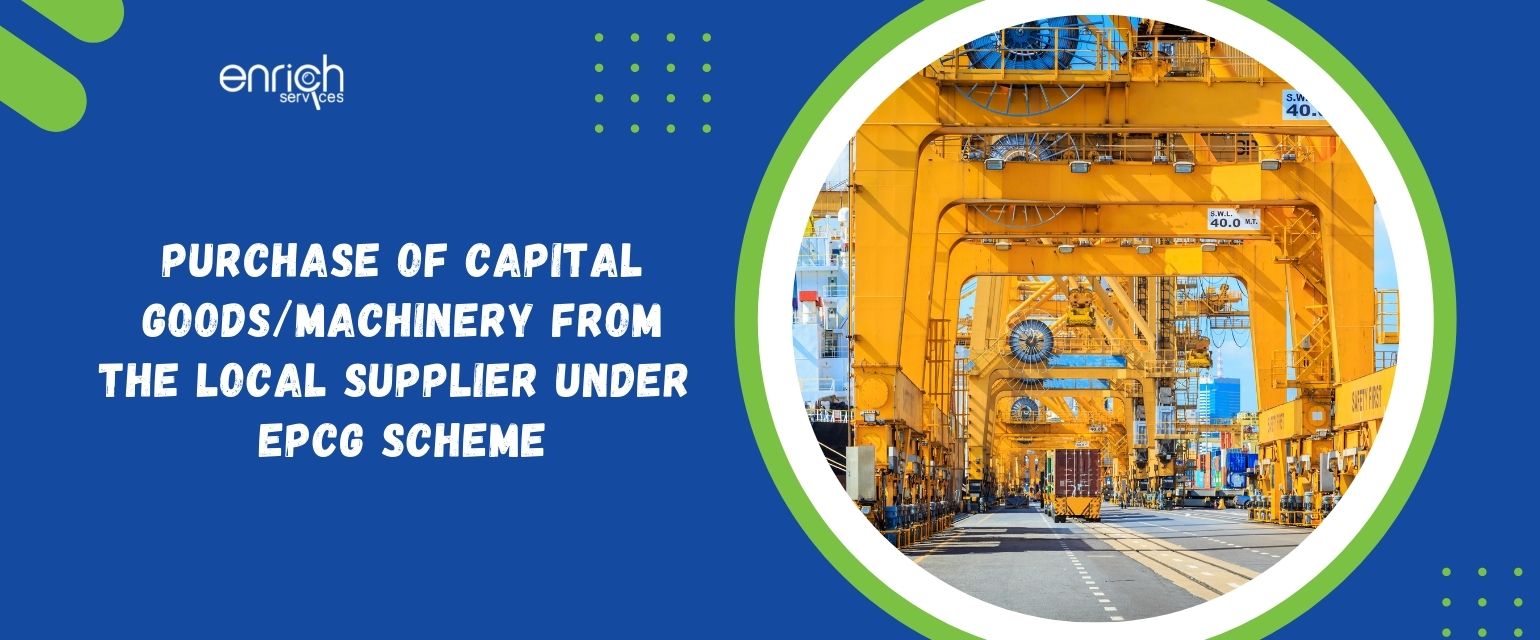Purchase of Capital Goods/Machinery from the Local Supplier under EPCG Scheme

Purchase of Capital Goods/Machinery from the Local Supplier under EPCG Scheme
Introduction
The Export Promotion Capital Goods (EPCG) Scheme was launched by the government of India to enhance the status of export and import in the country. Let’s gather more knowledge regarding the purchase of capital goods and machinery from the side of the local supplier. There is a separate procedure and guidelines for local procurement.
One fine benefit of the EPCG Scheme is that it allows the import of goods and services in all stages such as production, pre-production, and post-production at Zero customs duty. The Export Promotion Capital Goods involved in procurement of capital goods that are utilized in different stages of production.
An exporter is exempted from several duties under the EPCG Scheme like Basic Customs Duty, Safeguard Duty, Anti-Dumping Duty, Transitional Product Specific Safeguard Duty, and Antiguard Duty. The EPCG Scheme is great for the manufacturer exporter, merchant exporter along with a supporting manufacturer and a service provider.
What are the capital goods permitted under the EPCG Scheme?
As per the foreign trade policy, ‘capital goods’ have been defined as any plant, machinery, equipment, Spares or accessories etc. that are needed for the production of goods and services by direct means or indirect means.
The DGFT makes the final call about the import of the capital good after taking a look at the certificate that is sanctioned by an independent chartered engineer. The EPCG Scheme falls under the Foreign Trade Policy (FTP). This scheme also pays to heed towards the technological up-gradation or expansion in the indigenous industry.
Make sure that you are well versed with the eligibility criteria of the EPCG Scheme and then go ahead. The person needs to have profound knowledge about the extension period of the export obligation, a penalty that will be charged in case of not fulfilling the terms and conditions of the export obligation, Compensation cess under the EPCG Scheme, and selling goods in the Domestic Tariff Area (DTA).
How are capital goods purchased by a local supplier under the EPCG Scheme?
The EPCG License holder can source capital goods from a domestic manufacturer as well. The domestic manufacturer shall be eligible for deemed export benefits under paragraph 7.03 of FTP and as may be provided under GST rules under the category of deemed exports.
After obtainment of EPCG license from DGFT, license holder needs to again approach to DGFT for invalidation letter by executing Bond and Bank Guarantee as applicable. Domestic supplier should mention the EPCG and Invalidation details on their Supply invoices to get the deemed export benefits.
Before purchasing any kind of good from a local supplier make it a point to pass through every point stated on the official website of the DGFT. It will end up being very beneficial for you in the long run. For domestic sourcing also it is crucial to take permission from the licensing authority.
These capital goods can be utilized in various fields like mining, manufacturing industry, horticulture, poultry, sericulture, aquaculture, viticulture, pisciculture, floriculture, animal husbandry, and in the services department. The whole process of the purchase of capital goods or any type of machinery from a local supplier comes with its own rules and regulations. See to the fact that the goods qualify under the EPCG Scheme.
Best DGFT Consultants in Hyderabad
Authors Bio:-

